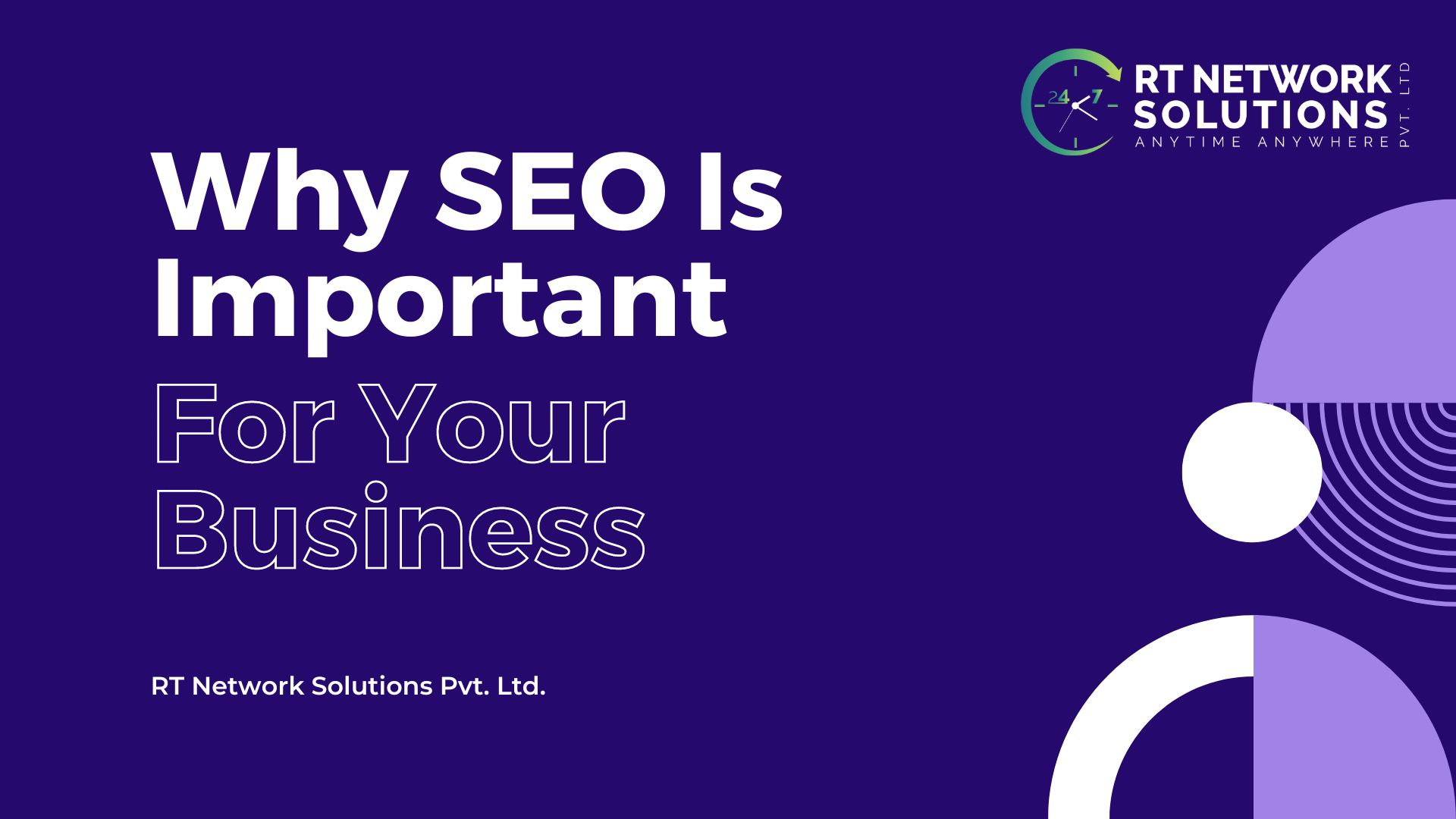Even for someone remotely interested in digital marketing, SEO is a must-include in the vocabulary. But, if you happen to be a new-age marketing manager responsible for business growth, this blog tells you why SEO is crucial for your business. SEO or Search Engine Optimisation is the process of improving a website’s visibility and ranking in search engine results pages (SERPs) for relevant keywords and phrases. It works to optimise various aspects of a website, including its content, structure, and HTML code, as well as acquiring backlinks from other websites to make it more attractive to search engines like Google, Bing, and Yahoo.
Table of Contents
ToggleSEO is Important to every Modern Business, Here’s why:
- Increased Visibility: Most internet users turn to search engines to seek information and hunt products, and services. By optimising your website for relevant keywords, you can increase its visibility in search results, making it more likely for potential customers to discover your business.
- Targeted Traffic: SEO helps attract targeted traffic to your website from users who are actively searching for what you offer. By optimising for specific keywords related to your products or services, you can attract visitors who are more likely to convert into leads or customers.
- Credibility and Trust: Websites that appear at the top of search results are often perceived as more credible and trustworthy by users. By improving your search engine ranking through SEO, you enhance your brand’s credibility and make it more likely that users will choose your business over competitors.
- Cost-Effectiveness: Compared to traditional advertising methods like print ads or TV commercials, SEO can be more cost-effective in the long run. Once your website is optimised and starts ranking well in search results, you can continue to attract organic traffic without having to pay for each click or impression.
- Competitive Advantage: In today’s competitive online marketplace, SEO can give your business an edge over competitors. By outranking competitors in search results, you can attract more traffic and potential customers to your website, leading to increased sales and revenue.
- Insight into Customer Behaviour: SEO tools provide valuable data about user behaviour, such as what keywords they use, what devices they use to access your site, and what pages they visit. This information can help you better understand your target audience and tailor your marketing strategies accordingly.

Can Businesses of Any Size Benefit from SEO?
Simply put, the answer is – Yes. Let’s take the case of Ramesh who runs a small business. Even he can benefit from SEO to enhance the Return on Investment (ROI) of his small business.
So, how does SEO work to build up Ramesh’s business?
- Gives Increased Visibility: By optimising his website for search engines, Ramesh can improve its visibility in search engine results pages (SERPs). This increased visibility can lead to more organic traffic to his website, ultimately resulting in more potential customers discovering his business.
- Ensures Targeted Traffic to his Website: SEO helps Ramesh target specific keywords and phrases relevant to his business. This means that the traffic driven to his website through SEO is more likely to consist of users who are actively searching for the products or services he offers, increasing the likelihood of conversions and improving ROI. In this manner, it ensures lead generation.
- Is a Cost-Effective Method: Compared to traditional advertising methods, SEO can be highly cost-effective. Once Ramesh’s website is optimised and starts ranking well in search results, he can continue to attract organic traffic without having to pay for each click or impression, resulting in a higher ROI over time.
- Enables Brand Building and Brand Awareness: SEO is not just about optimising for search engines; it’s also about creating a positive user experience building brand credibility and enhancing brand awareness. By providing valuable content and optimising his website for search, Ramesh can enhance his brand’s reputation and trustworthiness, leading to increased customer loyalty and repeat business.
- Gives Competitive Advantage: In competitive industries, SEO can provide Ramesh with a significant advantage. Even as a small business, he can outrank larger competitors by focusing on niche keywords and providing valuable content that meets the needs of his target audience, ultimately leading to a higher ROI.
- Provides Measurable Results: One of the benefits of SEO is its measurability. Ramesh can track key metrics such as content, keyword rankings, and conversion rates to evaluate the effectiveness of his SEO efforts and make data-driven decisions to continually improve ROI.
Thus, SEO can play a crucial role in enhancing the ROI of Ramesh’s small business by increasing visibility, driving targeted traffic, building brand credibility, and providing measurable results. Investing in SEO strategies tailored to his business goals and resources can help even a small businessperson achieve long-term growth and success.
SEO scenario in India…and elsewhere
As of recent updates available, Search Engine Optimization (SEO) has been gaining significant traction due to the increasing digitalisation and the growing importance of online presence for businesses. Typically, the adoption of SEO in India has been driven by several factors:
- Digital Transformation: With the increasing penetration of internet services and the rise of smartphone usage, businesses are recognising the importance of 0a strong online presence. This has led to a surge in demand for SEO services as companies aim to improve their visibility and ranking on search engine results pages (SERPs).
- E-commerce Boom: Most nations have witnessed a significant boom in e-commerce platforms. With more businesses establishing an online presence, competition for visibility has intensified. SEO becomes crucial for e-commerce players to rank higher and attract potential customers.
- Increasing Internet Penetration: India has been experiencing steady growth in Internet penetration, particularly in rural areas. This expanded internet access has widened the potential customer base for businesses, making SEO an essential tool for reaching these audiences effectively.
- Awareness and Education: As businesses become more aware of the benefits of SEO in improving online visibility and driving organic traffic, there’s been a growing interest in learning and implementing SEO strategies. This has led to an increase in SEO-related training programs, workshops, and online resources in India.
- Competitive Advantage: In a crowded market, businesses are recognising the need to differentiate themselves. An effective SEO strategy can provide a competitive edge by ensuring that the business is visible to potential customers when they search for relevant products or services.
It is safe to assume that these trends are likely to continue as more businesses recognise the importance of a robust online presence in an increasingly digital world.
SEO Outlook for the Future
The future outlook for SEO (Search Engine Optimization) remains highly promising for businesses across various industries as digital marketing strategies gain importance in marketing plans. Here are several key aspects that contribute to this positive outlook:
- Continued Growth in Online Activity: The trend towards digitalisation and online activity is expected to persist, driven by factors such as increased internet penetration, smartphone usage, and the popularity of online shopping. As more consumers turn to the internet to find information, products, and services, the importance of SEO in reaching and engaging these audiences will only grow.
- Evolution of Search Algorithms: Search engines continually refine their algorithms to deliver more relevant and accurate search results. This evolution presents both challenges and opportunities for businesses engaged in SEO. Staying abreast of algorithm updates and adapting SEO strategies accordingly will be crucial for maintaining and improving search rankings.
- Rise of Voice Search and AI: The increasing adoption of voice-activated assistants and AI-powered search technologies is changing how people interact with search engines. Optimising content for voice search and leveraging AI tools for keyword research and content optimization will become essential components of effective SEO strategies.
- Focus on User Experience (UX) and Intent: Search engines are placing greater emphasis on user experience and search intent when ranking websites. Businesses will need to prioritise UX elements such as site speed, mobile-friendliness, and intuitive navigation to enhance their SEO performance. Creating high-quality, relevant content that meets the needs and interests of target audiences will also be critical.
- Integration with Other Marketing Channels: SEO is becoming increasingly integrated with other digital marketing channels such as content marketing, social media, and paid advertising. Businesses that adopt a holistic approach to digital marketing and leverage SEO synergies with other channels are likely to see greater success in driving organic traffic and conversions.
Also read: Top 10 Social Media Marketing Trends in 2024 - Localisation and Personalisation: With the growing importance of local search and personalised search results, businesses will need to optimise their online presence for local SEO and tailor content to meet the needs of specific geographic regions and audience segments. This includes optimizing Google My Business listings, acquiring local citations, and crafting localised content.
- Emphasis on E-A-T (Expertise, Authoritativeness, Trustworthiness): Google’s emphasis on E-A-T signals underscores the importance of establishing credibility and trustworthiness in online content. Businesses will need to demonstrate expertise, authority, and trust across their digital footprint to rank well in search results and build long-term relationships with customers.
The future of SEO for businesses is bright, but it requires a proactive and adaptive approach to keep pace with evolving search trends, technologies, and user behaviours. By investing in quality content, user experience, and holistic digital marketing strategies, businesses can position themselves for success in the competitive online landscape.

















































